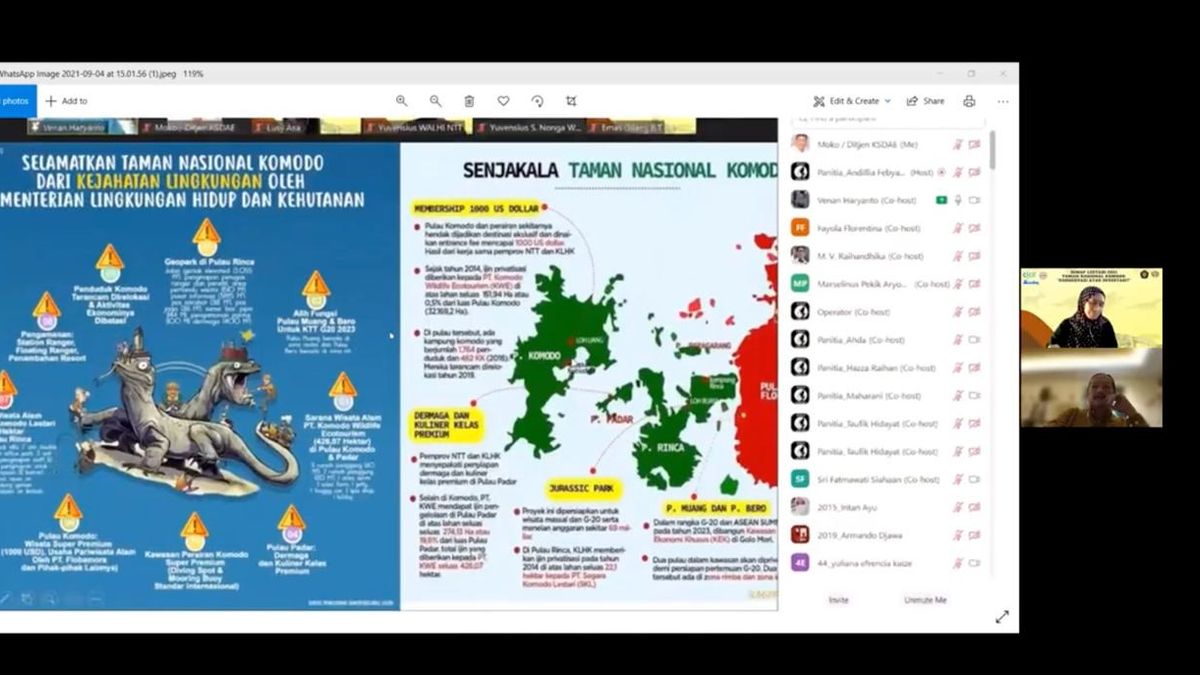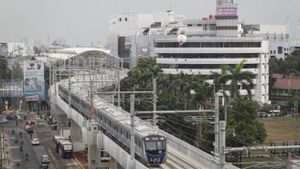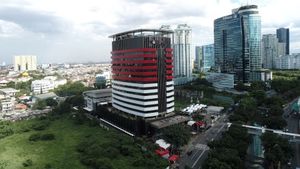JAKARTA - An official from the Ministry of Environment and Forestry (KLHK), joked in a webinar entitled Komodo National Park & Jurassic Park "Conservation or Investment?'. He was angry when there was a slide that cornered his institution. He even mentioned the criticism made by activists. the environment as a hoax.The question is why many officials are often emotional when criticized, not even a few who accuse the criticism of being a mere hoax?
In a video clip of the webinar that has gone viral on social media, Moko, a KLHK staff member, was furious when he saw a slide of one of the speakers from Sunspirit for Justice and Peace researcher Venan Haryanto. Moko said the writing on the slide made his party offended.
"Save Komodo National Park from environmental crimes by the Ministry of Environment and Forestry. What does this mean!" Moko said, quoted by VOI from the upload of Kawan Baik Komodo's Twitter account.
"We really are criminals!" he said. "It says there is a relocation of residents. Don't be like that. We're not criminals, wey. One by one!"
Other discussion participants then also chimed in. "There must be decency in making slides to KLHK," said one participant. "This is a hoax, the director general has already answered the information," said another.
"I just want to convey that we both respect each other's position. Avoid provocative narratives. And maybe the audience doesn't have enough time to understand various perspectives." Moko said.
"Especially if the explanation is that the Komodo dragons are threatened with relocation and their economic activities are limited. Like this, I don't know, this is very unfair information," he added.
Officials from the @KementerianLHK were angry at a seminar held by Brawijaya University on Komodo. A resource person from the NTT civil society called a number of policies in Komodo National Park—such as granting business concessions—as environmental crimes. KLHK officials are angry. The discussion participants reprimanded him. Part 1 pic.twitter.com/gsqKIYFNxp
— Kawan Baik Komodo (@KawanBaikKomodo) September 15, 2021
The anger of the Ministry of Environment and Forestry officials is just one example of the many policy makers who are "allergic" to criticism. So why does this happen? To answer this, we contacted the Public Policy Observer from Trisakti University Trubus Rahadiansyah.
Critical allergy phenomenonTo VOI Trubus explained that according to him, the reason many officials seem allergic to criticism is to cover up their low performance. "In the end a lot of officials, actually it covered his low performance."
During this COVID-19 pandemic, Trubus said, many officials have become dull in understanding the problem. "Many officials enjoy times like this pandemic. With big allowances - sufficient salary, but nothing is done. Or what is done is just a formality. That's a lot of things like that."
Incidents of officials getting angry when criticized as in the Komodo National Park webinar, Trubus often experiences it himself. Not infrequently his criticisms are also labeled as hoaxes.
"My criticisms are often called hoaxes. In fact, we convey something with data. I am an academician with data, Sunspirit researchers also use data. But they keep saying hoaxes, they are hostile. Like an allergy to criticism," Trubus said.
When talking about the millions of expired vaccines, for example, Trubus admitted that he had been scolded for criticizing this. "There was also the issue of social assistance, with the Governor of West Java, the Governor of Central Java. They initially agreed, but suddenly became angry in the next session."
On the issue of social assistance, Trubus criticized the accuracy of the data. According to him, regions often submit data that does not match the facts.
"I criticize many residents who previously did not support the regional head, then ended up being marginalized. Then those who vote, even though they are capable, can be considered as those who have the right even though they do not have the right. That angers them," explained Trubus.
And according to Trubus, the root of the problem for many officials who are angry when criticized is because they are afraid that their reputation as officials is threatened. "Because the criticism might be seen as undermining his position. Damaging the official's image, his reputation is in danger."
"So those who are angry when criticized are actually panicking. Maybe because there are more demands in the midst of a pandemic, so when they are unable to do so, they get angry. Like fear that they will be humiliated," added Trubus.
Criticism called hoaxThe Minister of Communication and Information (Menkominfo) Johny G. Plate was in the spotlight because of his statement at the Mata Najwa event on October 14, 2020.
During the event, Johnny said that the rumors circulating that severance pay was abolished and workers' leave was removed through the Job Creation Act were hoaxes. According to Johnny, the government knows best the substance of the Job Creation Act because it follows the first level decision-making with the DPR.
"If the government says it's a government version of a hoax, yes, it's a hoax. Why deny it again?," Johnny said when his claim was denied by the Chairperson of YLBHI Asfinawati and the Chairperson of BEM SI Remy Hastian who were also resource persons at the event.
Previously, KSPI President Said Iqbal explained that the rules regarding leave, for example, were not explicitly said to be abolished in the Job Creation Act. However, Said said, the fact is that long leave is no longer an obligation that must be given by employers, so it has the potential to be lost.
In Law 13 of 2003 Article 79 Paragraph (2) letter d it is expressly regulated, that employers must grant the right to two months of sabbatical leave to workers who have worked for six years. "Meanwhile, in the omnibus law, the article that regulates long leave is changed, so that long leave is no longer the obligation of entrepreneurs," said Said in a written statement, Friday, October 9, 2020.
Seeing and experiencing firsthand the number of officials who get angry when criticized makes Public Policy Observer Trubus Rahadiansyah commonplace. And he believes that what happened at the webinar about Komodo National Park is a small example of this phenomenon.
"I think what happened in the case of the Komodo National Park was the same. So the KLHK was angry. Even though this should be considered as an input, it must be evaluated.
Not without foundationGovernment officials should be wiser in accepting criticism. Don't be in a rush to get angry and then suddenly call it a hoax. In fact, the criticism submitted by Venan - a Sunsprit researcher whose slides were questioned by KLHK staff and officials - is not without basis.

It is known, UNESCO asked the Indonesian government to temporarily stop all infrastructure projects in and around Komodo National Park that have the potential to have an Outstanding Universal Value (OUV). "Urges the State party to stop all tourism infrastructure projects in and around the property with potential impacts of extraordinary universal value until a revised AMDAL is submitted and reviewed by IUCN," reads UNESCO World Heritage Committee document No. 44 COM 7B.9.
OUV (Outstanding Universal Value) is one of UNESCO's assessment criteria for the determination of world heritage. As quoted on the Sunspirit website, UNESCO then asked Indonesia to submit a revised AMDAL for the project which would then be reviewed by the International Union for Conservation of Nature (IUCN).
They also note that Indonesia provides detailed information from an integrated tourism master plan that shows how OUV properties will be protected, and how plans to realize mass tourism can ensure OUV protection. This report elicited mixed responses. Some environmentalists called the warning "too late," but some called it a "big win for conservation."
Instead, a relevant ministry official said UNESCO should "check" with the government before making an assessment.
*Read other information about POLITICS or read other interesting articles from Ramdan Febrian Arifin.
Other BERNASThe English, Chinese, Japanese, Arabic, and French versions are automatically generated by the AI. So there may still be inaccuracies in translating, please always see Indonesian as our main language. (system supported by DigitalSiber.id)










